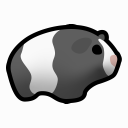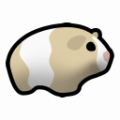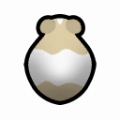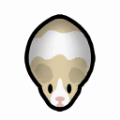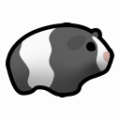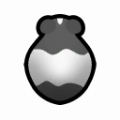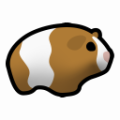Difference between revisions of "Guinea pig"
| (37 intermediate revisions by 8 users not shown) | |||
| Line 1: | Line 1: | ||
| − | {{ | + | {{Infobox main|animal |
| − | |name = Guinea | + | | name = Guinea pig |
| − | |image = | + | | image = Guinea pig 2 east.png |
| − | |description = | + | | description = Neither a pig or a creature from Guinea, these little rodents are bred to be a household pet and a delicious dinner. |
| − | |type = | + | | type = Animal |
| − | | | + | | movespeed = 5 |
| − | |bodysize = 0. | + | | min comfortable temperature = -15 |
| − | |healthscale = 1.0 | + | | max comfortable temperature = 55 |
| − | | | + | | flammability = 0.7 |
| − | | | + | | marketvalue = 150 |
| − | | | + | | combatPower = 33 |
| − | | | + | | bodysize = 0.2 |
| − | | | + | | healthscale = 0.4 |
| − | |attack1cool = | + | | hungerrate = 0.1 |
| − | | | + | | diet = herbivorous |
| − | | | + | | leathername = guinea pig fur |
| − | | | + | | wildness = 0.6 |
| − | | | + | | petness = 0.3 |
| − | | | + | | manhuntertame = 0 |
| − | | | + | | manhunter = 0 |
| − | | | + | | trainable = none |
| − | | | + | | nuzzleMtb = 24 |
| − | | | + | | gestation = 6.66 |
| − | | | + | | offspring = 1-3 |
| − | | | + | | avg offspring = 1.75 |
| − | | | + | | mateMtb = 8 |
| − | | | + | | lifespan = 4 |
| − | | | + | | juvenileage = 0.15 |
| − | |livesin_temperateforest = | + | | maturityage = 0.2 |
| − | | | + | | tradeTags = AnimalUncommon, AnimalPet |
| − | | | + | | attack1dmg = 3.6 |
| − | | | + | | attack1type = Scratch |
| − | | | + | | attack1cool = 1.5 |
| − | | | + | | attack1part = front left paw |
| + | | attack2dmg = 3.6 | ||
| + | | attack2type = Scratch | ||
| + | | attack2cool = 1.5 | ||
| + | | attack2part = front right paw | ||
| + | | attack3dmg = 5.8 | ||
| + | | attack3type = Bite | ||
| + | | attack3cool = 2 | ||
| + | | attack3part = teeth | ||
| + | | attack3chancefactor = 0.7 | ||
| + | | attack4dmg = 2 | ||
| + | | attack4type = Blunt | ||
| + | | attack4cool = 2 | ||
| + | | attack4part = head | ||
| + | | attack4chancefactor = 0.2 | ||
| + | | livesin_temperateforest = 0.45 | ||
| + | | livesin_temperateswamp = 0.15 | ||
| + | | livesin_coldbog = 0.07 | ||
| + | | livesin_aridshrubland = 0.017 | ||
| + | | livesin_desert = 0.01 | ||
| + | | livesin_extremedesert = 0.002 | ||
| + | | livesin_tropicalrainforest = 0.25 | ||
| + | | livesin_tropicalswamp = 0.18 | ||
}} | }} | ||
| − | + | '''Guinea pigs''' are tameable [[herbivore]]s with a fast movement speed. Guinea Pigs come in three colors: Cream, Black and Brown. | |
| − | '''Guinea | ||
== Acquisition == | == Acquisition == | ||
| − | Guinea pigs can be found in | + | Guinea pigs can be found in {{Habitats}}. They can either be tamed by a [[Work#Handle|handler]] or self-tame in a random event. |
Guinea Pigs can be bought and sold in other [[Trade#Faction base|faction bases]] and from [[Trade#Bulk goods trader 2|bulk goods traders]]. Guinea Pigs purchased from traders will be already tamed. | Guinea Pigs can be bought and sold in other [[Trade#Faction base|faction bases]] and from [[Trade#Bulk goods trader 2|bulk goods traders]]. Guinea Pigs purchased from traders will be already tamed. | ||
== Analysis == | == Analysis == | ||
| − | Guinea | + | Guinea pigs can be farmed for [[meat]] and [[guinea pig fur|fur]]. While each guinea pig is small, they reproduce rapidly, so a large pack of guinea pigs can produce a lot of material. Compared to [[chinchilla]]s, guinea pigs are not [[pen animal]]s, so they will need to constantly be re-tamed. However, guinea pigs can [[nuzzle]] and can be controlled via [[allowed area]]s. |
| + | |||
| + | Due to their high reproductive rate, guinea pigs can be used as bait animals. Set an [[allowed area]] towards the direction of raiders. This allows you to direct where the guinea pigs go, and they will be shot at rather than your colonists. This results in less meat & leather than slaughtering them would, but can be useful in combat. Compared to [[rat]]s and [[hare]]s, guinea pigs offer a more valuable fur and can nuzzle colonists, but are larger targets and reproduce less. | ||
| + | |||
| + | They are one of the few animals that can [[nuzzle]], occasionally giving a {{+|4}} ''Nuzzled'' moodlet to colonists. Guinea pigs and [[monkey]]s are the only 2 wild animals that can nuzzle. | ||
| − | + | === Leather === | |
| + | Guinea pigs have valuable [[guinea pig fur|fur]]. As clothing and building material, it has a few merits, but is generally lacking: | ||
| + | * Guinea pig fur may not have the best physical protection, but it has the best cold insulation in the game, protecting your colonists against cold temperatures. Guinea pig [[parka]]s are the most insulative gear in the game. In less extreme biomes, [[tribalwear]] can be used to protect against heat and cold, potentially letting you wear a [[jacket]] instead of a parka. However, guinea pigs are only native to tropical biomes, which ultimately limits this use. | ||
| + | * Guinea pig fur is very beautiful. However, only a select few objects can be made out of leather - a single [[armchair]]'s beauty is unlikely to have much impact. | ||
| + | Otherwise, the best use for their fur is for trade. It is a valuable resource, worth more than even [[devilstrand]]. | ||
| − | + | Female guinea pigs produce: | |
| + | * Baby slaughter: {{Icon Small|Guinea pig fur}} {{#expr:{{Leather Production|{{PAGENAME}}|baby}} round 2}} fur per day, or {{icon small|Guinea pig fur}} {{#expr:{{Leather Production|{{PAGENAME}}|baby}}/{{P|Real Hunger Rate}} round 3}} fur per 1 unit nutrition. | ||
| + | * Adult slaughter: {{Icon Small|Guinea pig fur}} {{#expr:{{Leather Production|{{PAGENAME}}|adult}} round 2}} fur per day, or {{icon small|Guinea pig fur}} {{#expr:{{Leather Production|{{PAGENAME}}|adult}}/{{Nutrition Consumption|{{PAGENAME}}|adult}} round 3}} fur per 1 unit nutrition. | ||
| + | When considering a 1:1 ratio of males:females, fur lowers to {{Icon Small|Guinea pig fur}}{{#expr:{{Leather Production|{{PAGENAME}}|baby|1|1}}/{{Nutrition Consumption|{{PAGENAME}}|baby|1|1}} round 3}} per 1 unit nutrition (baby), or {{Icon Small|Guinea pig fur}} {{#expr:{{Leather Production|{{PAGENAME}}|adult|1|1}}/{{Nutrition Consumption|{{PAGENAME}}|adult|1|1}} round 3}} per 1 unit nutrition (adult). A higher ratio of females will increase efficiency from there. | ||
| − | + | For the sole purpose of farming leather, [[chinchilla]]s are superior as they do not need to be retamed. Guinea pigs have some non-leather advantages, as listed above. | |
== Training == | == Training == | ||
| Line 55: | Line 87: | ||
== Health == | == Health == | ||
| − | + | {{Animal Health Table|QuadrupedAnimalWithPawsAndTail}} | |
| − | |||
| − | { | ||
| − | |||
| − | |||
| − | |||
| − | |||
| − | |||
| − | |||
| − | |||
| − | |||
| − | |||
| − | |||
| − | |||
| − | |||
| − | |||
| − | |||
| − | |||
| − | |||
| − | |||
| − | |||
| − | |||
| − | |||
| − | |||
| − | |||
| − | |||
| − | |||
| − | |||
| − | |||
| − | |||
| − | |||
| − | |||
| − | |||
| − | |||
| − | |||
| − | |||
| − | |||
| − | |||
| − | |||
| − | |||
| − | |} | ||
| − | |||
| − | |||
| − | |||
| + | == Gallery == | ||
| + | <gallery> | ||
| + | Guinea pig 1 east.png|Cream variant facing east | ||
| + | Guinea pig 1 north.png|Cream variant facing north | ||
| + | Guinea pig 1 south.png|Cream variant facing south | ||
| + | Dessicated guinea pig east.png|Decaying | ||
| + | </gallery> | ||
| + | <gallery> | ||
| + | Guinea pig 2 east.png|Black variant facing east | ||
| + | Guinea pig 2 north.png|Black variant facing north | ||
| + | Guinea pig 2 south.png|Black variant facing south | ||
| + | </gallery> | ||
| + | <gallery> | ||
| + | Guinea pig 3 east.png|Brown variant facing east | ||
| + | Guinea pig 3 north.png|Brown variant facing north | ||
| + | Guinea pig 3 south.png|Brown variant facing south | ||
| + | </gallery> | ||
| − | ==Version | + | == Version history == |
* [[Version/1.1.0|1.1.0]] - Added as part of the integration of the Vanilla Animals Expanded - Livestock mod into the basegame. | * [[Version/1.1.0|1.1.0]] - Added as part of the integration of the Vanilla Animals Expanded - Livestock mod into the basegame. | ||
| − | {{ | + | |
| + | {{Nav|animal|wide}} | ||
[[Category:Animals]] | [[Category:Animals]] | ||
| − | [[Category:Farm]] | + | [[Category:Farm animal]] |
Latest revision as of 00:55, 16 July 2024
Guinea pig
Neither a pig or a creature from Guinea, these little rodents are bred to be a household pet and a delicious dinner.
Base Stats
- Type
- Animal
- Flammability
- 70%
Pawn Stats
- Combat Power
- 33
- Move Speed
- 5 c/s
- Health Scale
- 40% HP
- Body Size
- 0.2
- Mass - Baby
- 2.4 kg
- Mass - Juvenile
- 6 kg
- Mass - Adult
- 12 kg
- Carrying Capacity
- 15 kg
- Filth Rate
- 1
- Hunger Rate
- 0.16 Nutrition/Day
- Diet
- herbivorous
- Life Expectancy
- 4 years
- Manhunter Chance
- 0%
- Manhunter Chance (Taming)
- 0%
- Trainable Intelligence
- None
- Wildness
- 60%
- Minimum Handling Skill
- 5
- Nuzzle Interval
- 1 day
- Mate Interval
- 8 hours
- Maturity Age
- 0.2 years (12 days)
- Juvenile Age
- 0.15 years (9 days)
- Comfortable Temp Range
- -15 °C – 55 °C (5 °F – 131 °F)
Production
- Meat Yield
- 31
 guinea pig meat
guinea pig meat - Leather Yield
- 16
 guinea pig fur
guinea pig fur - Gestation Period
- 6.66 days
- Offspring Per Birth
- 1-3 (1.75 avg)
Melee Combat
- Attack 1
- Front left paw
3.6 dmg (Scratch)
5 % AP
1.5 second cooldown - Attack 2
- Front right paw
3.6 dmg (Scratch)
5 % AP
1.5 second cooldown - Attack 3
- Teeth
5.8 dmg (Bite)
9 % AP
2 second cooldown
0.7 chance factor - Attack 4
- Head
2 dmg (Blunt)
3 % AP
2 second cooldown
0.2 chance factor - Average DPS
- 1.35
- tradeTags
- AnimalUncommon, AnimalPet
Guinea pigs are tameable herbivores with a fast movement speed. Guinea Pigs come in three colors: Cream, Black and Brown.
Acquisition[edit]
Guinea pigs can be found in temperate forests, temperate swamps, tropical rainforests, tropical swamps, arid shrublands, deserts, extreme deserts, and cold bogs. They can either be tamed by a handler or self-tame in a random event.
Guinea Pigs can be bought and sold in other faction bases and from bulk goods traders. Guinea Pigs purchased from traders will be already tamed.
Analysis[edit]
Guinea pigs can be farmed for meat and fur. While each guinea pig is small, they reproduce rapidly, so a large pack of guinea pigs can produce a lot of material. Compared to chinchillas, guinea pigs are not pen animals, so they will need to constantly be re-tamed. However, guinea pigs can nuzzle and can be controlled via allowed areas.
Due to their high reproductive rate, guinea pigs can be used as bait animals. Set an allowed area towards the direction of raiders. This allows you to direct where the guinea pigs go, and they will be shot at rather than your colonists. This results in less meat & leather than slaughtering them would, but can be useful in combat. Compared to rats and hares, guinea pigs offer a more valuable fur and can nuzzle colonists, but are larger targets and reproduce less.
They are one of the few animals that can nuzzle, occasionally giving a +4 Nuzzled moodlet to colonists. Guinea pigs and monkeys are the only 2 wild animals that can nuzzle.
Leather[edit]
Guinea pigs have valuable fur. As clothing and building material, it has a few merits, but is generally lacking:
- Guinea pig fur may not have the best physical protection, but it has the best cold insulation in the game, protecting your colonists against cold temperatures. Guinea pig parkas are the most insulative gear in the game. In less extreme biomes, tribalwear can be used to protect against heat and cold, potentially letting you wear a jacket instead of a parka. However, guinea pigs are only native to tropical biomes, which ultimately limits this use.
- Guinea pig fur is very beautiful. However, only a select few objects can be made out of leather - a single armchair's beauty is unlikely to have much impact.
Otherwise, the best use for their fur is for trade. It is a valuable resource, worth more than even devilstrand.
Female guinea pigs produce:
- Baby slaughter:
 1.05 fur per day, or
1.05 fur per day, or  6.569 fur per 1 unit nutrition.
6.569 fur per 1 unit nutrition. - Adult slaughter:
 4.2 fur per day, or
4.2 fur per day, or  10.357 fur per 1 unit nutrition.
10.357 fur per 1 unit nutrition.
When considering a 1:1 ratio of males:females, fur lowers to ![]() 3.285 per 1 unit nutrition (baby), or
3.285 per 1 unit nutrition (baby), or ![]() 7.429 per 1 unit nutrition (adult). A higher ratio of females will increase efficiency from there.
7.429 per 1 unit nutrition (adult). A higher ratio of females will increase efficiency from there.
For the sole purpose of farming leather, chinchillas are superior as they do not need to be retamed. Guinea pigs have some non-leather advantages, as listed above.
Training[edit]
This animal can be trained as follows:
| Guard: | |
|---|---|
| Attack: | |
| Rescue: | |
| Haul: | |
*As of version 1.1.2610, all animals can be tamed. The percentage of likelihood of success depends on factors such as the Animals Wildness Percentage, Pawn Handling Skill, and others. More information can be found on the animals page.
Health[edit]
| Part Name | Health | Quantity | Coverage[1] | Target Chance[2] | Subpart of | Internal | Capacity[3] | Effect if Destroyed/Removed |
|---|---|---|---|---|---|---|---|---|
| Body | 16 | 1 | 100% | 21% | N/A[4] | - | Death | |
| Tail | 4 | 1 | 7% | 7% | Body | - | - | |
| Spine | 10 | 1 | 3% | 3% | Body | Moving |
−100% Moving[5] | |
| Stomach | 8 | 1 | 3% | 3% | Body | Digestion |
−50% Digestion | |
| Heart | 6 | 1 | 3% | 3% | Body | Blood Pumping |
Death | |
| Lung | 6 | 2 | 3% | 3% | Body | Breathing |
−50% Breathing. Death if both lost. | |
| Kidney | 6 | 2 | 3% | 3% | Body | Blood Filtration | −50% Blood Filtration. Death if both lost. | |
| Liver | 8 | 1 | 3% | 3% | Body | Digestion |
Death | |
| Neck | 10 | 1 | 20% | 5% | Body | Eating Talking Breathing |
Death | |
| Head | 10 | 1 | 75% | 2.25% | Neck | - | Death | |
| Skull | 10 | 1 | 25% | 1.125% | Head | - | Cannot be destroyed Increasing Pain based on damage. | |
| Brain | 4 | 1 | 70% | 2.625% | Skull | Consciousness |
Death Damage always results in scarring. | |
| Eye | 4 | 2 | 12% | 1.8% | Head | Sight |
−25% Sight. −100% if both lost. Damage always results in scarring. 0% Hit Chance against Blunt damage. | |
| Ear | 4.8 | 2 | 8% | 1.2% | Head | Hearing |
−25% Hearing. −100% if both lost. | |
| Nose | 4 | 1 | 10% | 1.5% | Head | - | - | |
| AnimalJaw | 4 | 1 | 10% | 1.5% | Head | Manipulation |
−100% Manipulation. Can no longer use Bite attack. | |
| Front Leg | 12 | 2 | 7% | 5.95% | Body | Moving |
−25% Moving. −50% if both lost. Can no longer use paw attack.[6] | |
| Front Paw | 4 | 2 | 15% | 1.05% | Front Leg | Moving |
−25% Moving. −50% if both lost. Can no longer use paw attack. | |
| Rear Leg | 12 | 2 | 7% | 5.95% | Body | Moving |
−25% Moving. −50% if both lost. | |
| Rear Paw | 4 | 2 | 15% | 1.05% | Rear Leg | Moving |
−25% Moving. −50% if both lost. |
- ↑ Coverage determines the chance to hit this body part. It refers to the percentage of the super-part that this part covers, before its own sub-parts claim their own percentage. For example, if the base coverage of the super-part is 100%, and the coverage of the part is 20%, 20% of hits would hit the part, and 80% the super-part. If the part had its own sub-part with 50% coverage, the chances would be 10% sub-part, 10% part, 80% super part.
- ↑ Target Chance is the actual chance for each part to be be selected as the target when each part's coverage has been taken into account(I.E. Neck covers 7.5% of Torso but Head covers 80% of Neck so it actually has only a 1.5% chance to be selected). This is not pure hit chance, as different damage types propagate damage in different ways. See that page for details.
- ↑ Note that capacities can affect other capacities in turn. Only the primary effect is listed. See specific pages for details.
- ↑ This is the part that everything else connects to to be considered 'connected'.
- ↑ If Moving drops below 16% a pawn cannot move.
- ↑ A Scratch attack that varies from animal to animal. Each front paw allows one attack.
Gallery[edit]
Version history[edit]
- 1.1.0 - Added as part of the integration of the Vanilla Animals Expanded - Livestock mod into the basegame.
